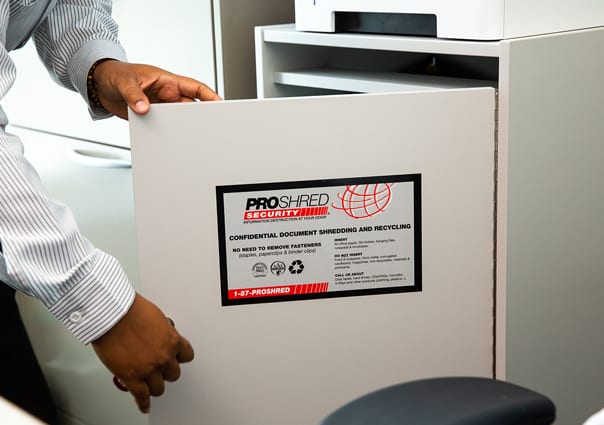Financial Records


When and How To Dispose of Financial Records
Business financial records include any corporate accounts statements, audits, forms and activity related to these procedures. Some of these documents may overlap with categories found in other sections within this guide.
Suggested Retention Duration for Select Financial Records
| Document Type | Suggested Minimum Retention |
| Accounts receivable, accounts payable ledgers and schedules | 7 years |
| Audit reports | Permanently |
| Bank statements, electronic funds transfer documents, deposit records, cancelled checks | 7 years |
| Chart of accounts | Permanently |
| Checks for large or crucial purchases | Permanently |
| Correspondence with vendors and customers | 2 years |
| Deeds, bills of sale, mortgages for held assets | Permanently |
| Depreciation schedules and reports | Permanently |
| Donations | 7 years |
| Year-end financial statements | Permanently |
| Garnishments | 7 years |
| General business/finance ledgers, year-end trial balance | Permanently |
| Government grants (funded) | 7 years after final closure |
| Insurance policies | 3 years after expiration |
| Insurance records such as claims, accident reports, settlements | Permanently |
| Internal audit reports | 3 years |
| Invoices to customers or from vendors | 7 years |
| Inventory records | 7 years |
| Loan documentation | Permanently |
| Patents, copyrights, trademarks and related documentation | Permanently |
| Petty cash vouchers | 3 years |
| Property/asset appraisals | Permanently until sale |
| Property blueprints and utility diagrams | Permanently until sale |
| Purchase orders | 7 years |
| Sales records | 7 years |
| Corporate tax returns and worksheets | Permanently |
| Timekeeping sheets, books, cards, etc. | 7 years |
| Receipts and vouchers of payment to employees or vendors | 7 years |
| Payroll tax withholding statements | 7 years |
| Documentation of workers compensation claims | 10 years after final settlement |

Disposing of Financial Records Properly
Once the decided retention duration has passed according to your retention schedule, organizations are strongly recommended to completely destroy all financial documentation through a secure, transparent process.
This process will be identical to the recommended guidelines for secure document destruction found on the How to Dispose of Contracts page.
Different processes are outlined in paper and digital materials.
Other Documents
A similar table will be provided in the corresponding sections for:
- Corporate Records
- Business Taxes Records
- Personnel Records
- Management Plans and Procedures
- Contracts
- Donor Records
Important note: This list is only meant as a general guideline, not a substitute for legal advice. Consult your CPA or a New York business attorney for specific advice on best practices and legal compliance requirements.
NAID Certified
Complies with and fulfills all regulatory
requirements and policies of the
National Association for Information Destruction

What People Are Saying About Proshred®
I am extraordinarily pleased with the outstanding service Steve and his partner provided to me when they came to shred close to 800 pounds of... read moreI am extraordinarily pleased with the outstanding service Steve and his partner provided to me when they came to shred close to 800 pounds of paper! They were knowledgeable, courteous, prompt and absolutely professional!!!!
As an identity theft specialist I know how important it is to shred personal information and how tempting it can be to just throw caution to the wind and just dump it.
Safe Shred is the answer to this dilemma!
If expense is an issue, pool your shredding with family and friends and share the peace of mind from an uncluttered environment!!!!!!
LOVED IT!!! read lessEileen Marcial12/08/2014Fast response on a quote and to set up an appointment by Joe. They kept me posted on the time and appointment. The two employees... read moreFast response on a quote and to set up an appointment by Joe. They kept me posted on the time and appointment. The two employees Phil & Scott were very professional, friendly and hard working and finally, the price was fair. I would recommend them to anyone. Thank you! read less
P9/27/2013I use them for my company, The O'Donnell Agency, and would definitely recommend them to everyone. Their professionalism and service is impeccable. They are... read moreI use them for my company, The O'Donnell Agency, and would definitely recommend them to everyone. Their professionalism and service is impeccable. They are very reliable, always on time, and call ahead of time to let you know that they are on their way. They work very fast to get many bags of shredding out of our office. They are wonderful and I will make sure to recommend to all my friends/clients. read less
Erin Griffith9/27/2015I don't know why you would even consider using anyone else. Extremely professional from scheduling, prompt arrival and courteous and friendly service. If... read moreI don't know why you would even consider using anyone else. Extremely professional from scheduling, prompt arrival and courteous and friendly service. If the form allowed it, I would give more then 5 stars. read less
Lyn Wagner9/27/2018
